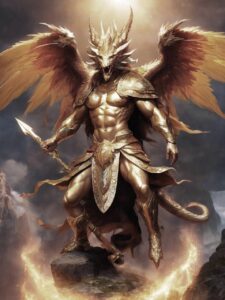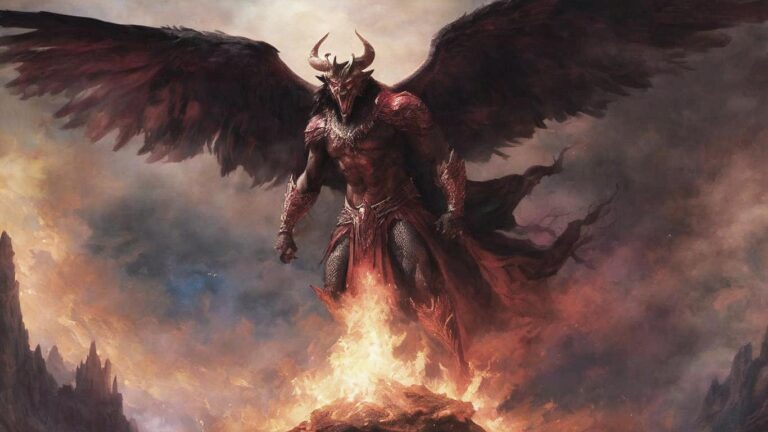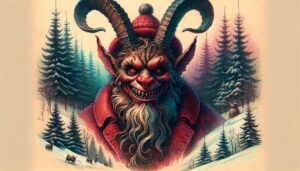Table of Contents
Who Is Belial?
Belial is a figure that appears in various religious and mythological traditions, often associated with themes of evil, rebellion, and wickedness. The name “Belial” is derived from the Hebrew term “Beli ya’al,” which can be translated to mean “worthless” or “wicked.” The character is not consistently portrayed in the same way across different traditions, and interpretations can vary.
Belial is a figure mentioned in various religious texts, and key facts about Belial are often rooted in Judeo-Christian traditions. Here are some key aspects:
Etymology: The name “Belial” is of Hebrew origin and is often translated as “worthless” or “wicked.” It appears in the Hebrew Bible (Old Testament) and other Jewish texts.
Biblical References: Belial is mentioned several times in the Bible, often in the context of evil and lawlessness. The term is used in both the Old and New Testaments.
Associations with Evil: Belial is often portrayed as a symbol of wickedness, lawlessness, and rebellion against God. In the Bible, the term is used to describe those who are ungodly or engage in sinful behavior.
Deceptive Nature: Belial is sometimes associated with deceit and trickery. In the New Testament, it is used in the context of contrasting believers with unbelievers, emphasizing the opposition between light and darkness.
Apocryphal Texts: Some early Jewish texts outside the canonical Bible, such as the Dead Sea Scrolls and the Book of Enoch, contain references to Belial. These texts provide additional context for understanding the figure.
Occult and Esoteric Traditions: The name Belial has been adopted in certain occult and esoteric traditions, where it may be invoked or used symbolically to represent various aspects of the demonic or rebellious.
Literary and Cultural References: Belial may be referenced in literature, art, and popular culture. Creative works often draw on the historical associations with evil and rebellion, adapting the figure to fit various narratives.
Role in Demonology: In demonology, Belial is sometimes classified as a demon or a fallen angel. Different occult traditions may have varying interpretations of Belial’s nature and characteristics.
Symbolism of Chaos: Belial is occasionally associated with chaos and disorder, representing a force that opposes divine order and righteousness.
Modern Adaptations: Belial’s image and significance may be adapted and reinterpreted in modern works, including movies, music, and literature, where the figure is sometimes used as a symbol of malevolence or rebellion.
Belial figure

Belial is often depicted as a significant figure in demonology, possessing an alluring appearance and a persuasive demeanor that conceals a nature marked by deceit and malevolence.
In certain occult traditions, Belial holds the 68th position among the 72 Spirits of Solomon, specializing in instigating wickedness and fostering guilt among humans, particularly in matters involving sexual perversions, fornication, and lust.
Saint Paul regarded Belial as a chief among demons, reinforcing the perception of his malevolent stature.
The etymology of Belial’s name traces back to the Hebrew term “beli ya’al,” signifying “without worth.” In Hebrew lore, Belial is described as an angel subsequent to Lucifer, belonging partly to the order of angels and partly to the order of virtues.
Having rebelled against God from the outset, Belial’s fall from heaven led to his transformation into the embodiment of lies and evil. The name Belial is sometimes used interchangeably with Satan or the Antichrist. The Old Testament employs the phrase “sons of Belial” to denote individuals characterized by worthlessness and recklessness.
The pseudepigraphical text, the Testament of Solomon, portrays Belial as a participant in a dance before King Solomon and as one of the demons operating under Solomon’s command, guided by the king’s magical ring.
Within the Dead Sea Scrolls, Belial is identified as the leader of the Sons of Darkness, holding the position of chief among all devils and being devoted to the pursuit of destruction.
In a Qumran text called the Testament of Amran (Q543, 545–48), Belial is recognized as one of the Watchers, bearing the titles of Belial, Prince of Darkness, and King of Evil. His dominion extends over all darkness, with every aspect of his existence shrouded in obscurity.
Johann Weyer asserted that Belial commands 80 legions of demons and serves as an infernal ambassador to Turkey.
According to the magical grimoire the Lemegeton, invoking Belial requires sacrifices and offerings. He manifests as a beautiful angel riding a chariot drawn by firebreathing dragons, and his speech is enchanting. While he may not always uphold his promises to magicians, those who manage to earn his true favor are generously rewarded with benevolent Familiars and various privileges, including preferences for senatorships or political offices.
Belial in “The Goethia”
“The Goetia: The Lesser Key of Solomon the King,” a grimoire written by S.L. MacGregor Mathers in 1904. This text is a part of a larger work known as the “Greater” and “Lesser Keys of Solomon,” which are attributed to the legendary biblical king, Solomon, and are significant in Western occultism.
In this passage, Belial is described as the Sixty-eighth Spirit, a Mighty and Powerful King, and one of the entities created soon after Lucifer. Belial is said to appear in the form of two beautiful angels sitting in a chariot of fire, and he speaks with a comely voice. The text attributes a fall from grace to Belial, stating that he fell before Michael and other heavenly angels.
Belial’s designated office involves the distribution of presentations and senatorships, as well as influencing favor from both friends and foes. The passage also mentions Belial’s ability to provide excellent familiars (spiritual entities that assist the magician) and his governance over 50 legions of spirits.
A significant point emphasized is that for Belial to provide true answers to the exorcist’s demands, offerings, sacrifices, and gifts must be presented. However, it is noted that Belial’s truthfulness is fleeting, lasting only for an hour unless constrained by divine power. The excerpt concludes by mentioning Belial’s seal, which is to be worn by the practitioner.
What is Belial the Lord of?
Belial is often associated with being a demon or a symbolic representation of wickedness and lawlessness. He is not typically referred to as a lord of a specific domain.
How powerful is Belial?
Belial's power is often depicted in mythological and religious contexts. In various traditions, he is considered a powerful demonic figure associated with rebellion and deceit.
Who is the child of Belial?
In some biblical and mythological traditions, the term "sons of Belial" is used to describe wicked or worthless individuals. However, Belial is not commonly depicted as having literal children.
What is the curse of Belial?
There isn't a specific curse attributed to Belial. In some traditions, invoking the name of Belial may be associated with negative consequences due to his association with wickedness.
Is Belial a prime evil?
In certain occult and demonic hierarchies, Belial is not considered one of the prime evils. The concept of prime evils is more commonly associated with specific demons or entities in various belief systems.
Where is Belial?
Belial is often mentioned in religious texts, occult literature, and mythological traditions. The exact nature of his existence and whereabouts varies across different belief systems.
Does Belial have children?
In biblical and literary contexts, the term "sons of Belial" is used to describe wicked individuals. However, this is generally a symbolic expression and not an indication of literal offspring.
What is Belial weak to?
Belial's weaknesses are often depicted symbolically, representing moral and spiritual failings. In various traditions, invoking the name of Belial may be associated with negative consequences.
Is Belial a Demon Lord?
Belial is often considered a demon or demonic figure associated with deception and rebellion. Whether he is classified as a Demon Lord depends on the specific occult or religious system.
What does Belial mean in Greek?
The name Belial is of Hebrew origin, not Greek. It is often translated to mean "worthless" or "wicked" in Hebrew.
What's the opposite of a fallen angel?
The opposite of a fallen angel would be an angel who has remained faithful and has not fallen from grace. Fallen angels are those who rebelled against divine authority.
Where is Asmodeus in the Bible?
Asmodeus is not mentioned in the canonical Hebrew Bible (Old Testament). He appears in certain later Jewish and Christian texts, such as the Book of Tobit.
Who is Belial in Diablo?
In the "Diablo" video game series, Belial is one of the Prime Evils, a demon lord associated with lies and deceit. He is a major antagonist in the series.
What is the behemoth in the Bible?
The behemoth is mentioned in the Book of Job in the Bible, describing a large and powerful creature. Interpretations vary, with some considering it a symbolic representation of chaos.
What does the devil mean in Hebrew?
The term "devil" is not of Hebrew origin. In Hebrew, the term often associated with a malevolent supernatural being is "Satan."
What movie is the demon Belial in?
Belial is a character in the "Basket Case" film series, a cult horror franchise directed by Frank Henenlotter.
Who was Beelzebub in the KJV Bible?
Beelzebub is mentioned in the King James Version (KJV) of the Bible as a Philistine god. In later Christian tradition, Beelzebub became associated with a demonic figure.
Why did Belial turn evil?
Belial is typically considered a symbolic representation of evil or wickedness rather than an individual who turned evil. The origins of the concept of Belial vary across different religious and mythological traditions.
How to pronounce Belial?
Belial is pronounced approximately as "bee-lee-ul," with the stress on the first syllable.




